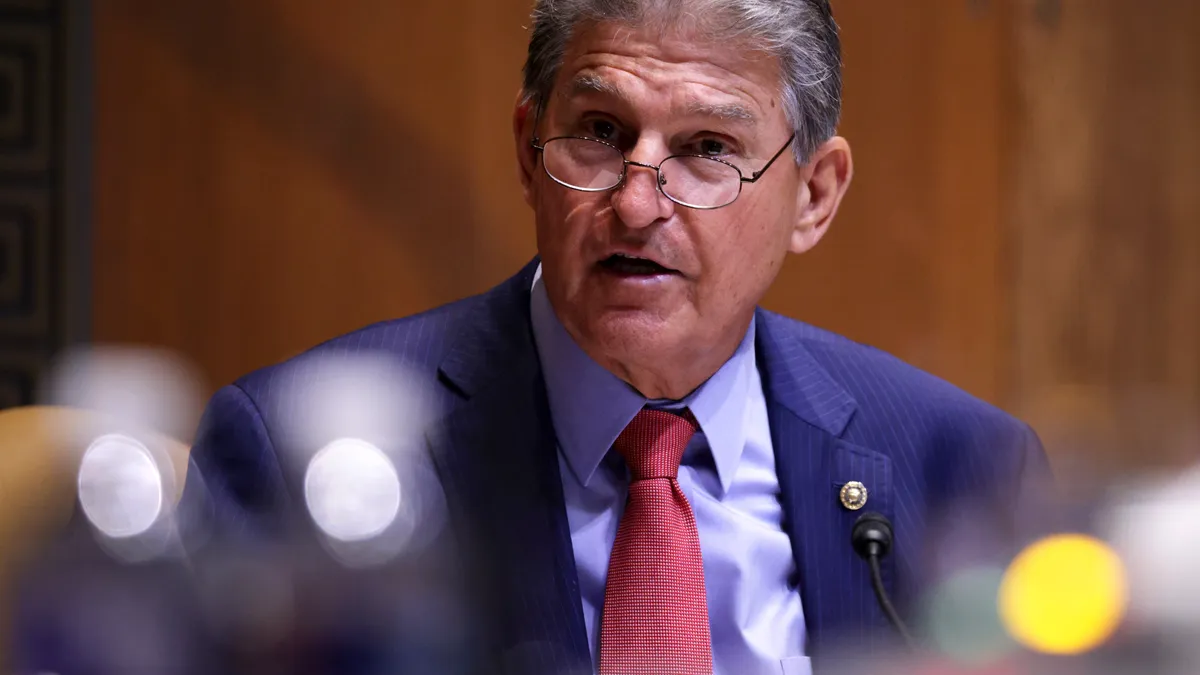Dive Brief:
-
Democratic leaders plan to move ahead with key climate and social spending legislation despite Sen. Joe Manchin, D-W.Va., on Sunday saying he opposed the $1.9 trillion Build Back Better bill, which includes new and expanded tax credits for the power sector and funding for electric vehicles and transmission lines.
-
If enacted, the bill would threaten grid reliability and increase U.S. dependence on foreign supply chains, Manchin said in a statement. The House of Representatives passed the bill in November.
-
House and Senate Democratic leaders plan to try to pass the bill early next year. In the Senate, without Republican support, Democrats need every member of their party to vote for the bill in order to pass it.
Dive Insight:
Along with various social programs, the Build Back Better bill contains about $550 billion over 10 years for clean energy and climate programs, reflecting key elements of the Biden administration's climate policies.
The energy programs in the bill aren't needed and would help drive up inflation, according to Manchin.
"The energy transition my colleagues seek is already well underway in the United States of America," said Manchin, who owns part of Enersystems, a coal business he helped found.
"We have invested billions of dollars into clean energy technologies so we can continue to lead the world in reducing emissions through innovation," Manchin said. "But to do so at a rate that is faster than technology or the markets allow will have catastrophic consequences for the American people like we have seen in both Texas and California in the last two years."
The bill isn't dead, according to Democratic leaders. Senate Majority Leader Chuck Schumer, D-N.Y., plans to bring the bill to a vote early next year.
"We are going to vote on a revised version of the House-passed Build Back Better Act – and we will keep voting on it until we get something done," Schumer said in a Monday letter to the Senate Democratic caucus.
House Speaker Nancy Pelosi, D-Calif., also pledged action on the legislation. "Our work for the people demands that we stay at the table to pass the Build Back Better Act," Pelosi said Sunday in a message to House Democrats. "While it is disappointing that we may not have a law by the end of the year, we are hopeful that we will soon reach agreement so that this vital legislation can pass as soon as possible next year."
The White House is also looking to move the legislation forward, potentially by getting Manchin to change his stance on the bill.
"Just as Senator Manchin reversed his position on Build Back Better this morning, we will continue to press him to see if he will reverse his position yet again," White House Press Secretary Jen Psaki said Sunday in a statement. "We will find a way to move forward next year."
Environmental and renewable energy trade groups support plans to continue working on the legislation.
"This is not over. The clean energy tax platform and grid infrastructure provisions in the Build Back Better Act are our last, best chance to tackle climate change," Gregory Wetstone, American Council on Renewable Energy president and CEO, said in a statement Sunday. "We will be working with Congress to find a way forward and deliver the clean energy future Americans want and deserve."
The Natural Resources Defense Council (NRDC) echoed those comments.
"The stakes for the country are too high. Inaction would cripple our economy, as climate costs and dangers rise," Manish Bapna, NRDC president and CEO, said in a statement. "Congress must return in early January to enact this measure without fail or delay."
Some groups are already looking outside Washington, DC, for action on climate change.
"We will only push harder on our elected officials at all levels of government to do their jobs and protect us from the deadly reality of accelerating climate change," Earthjustice President Abigail Dillen said in a statement.















